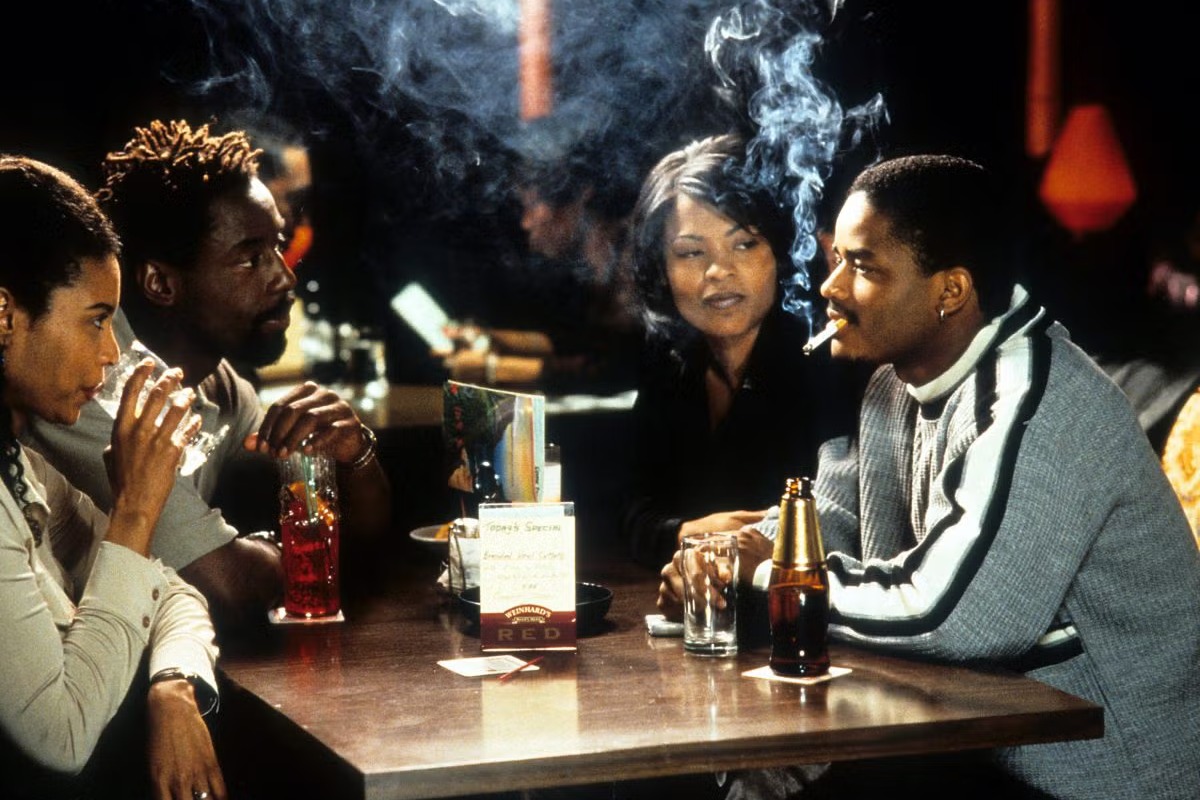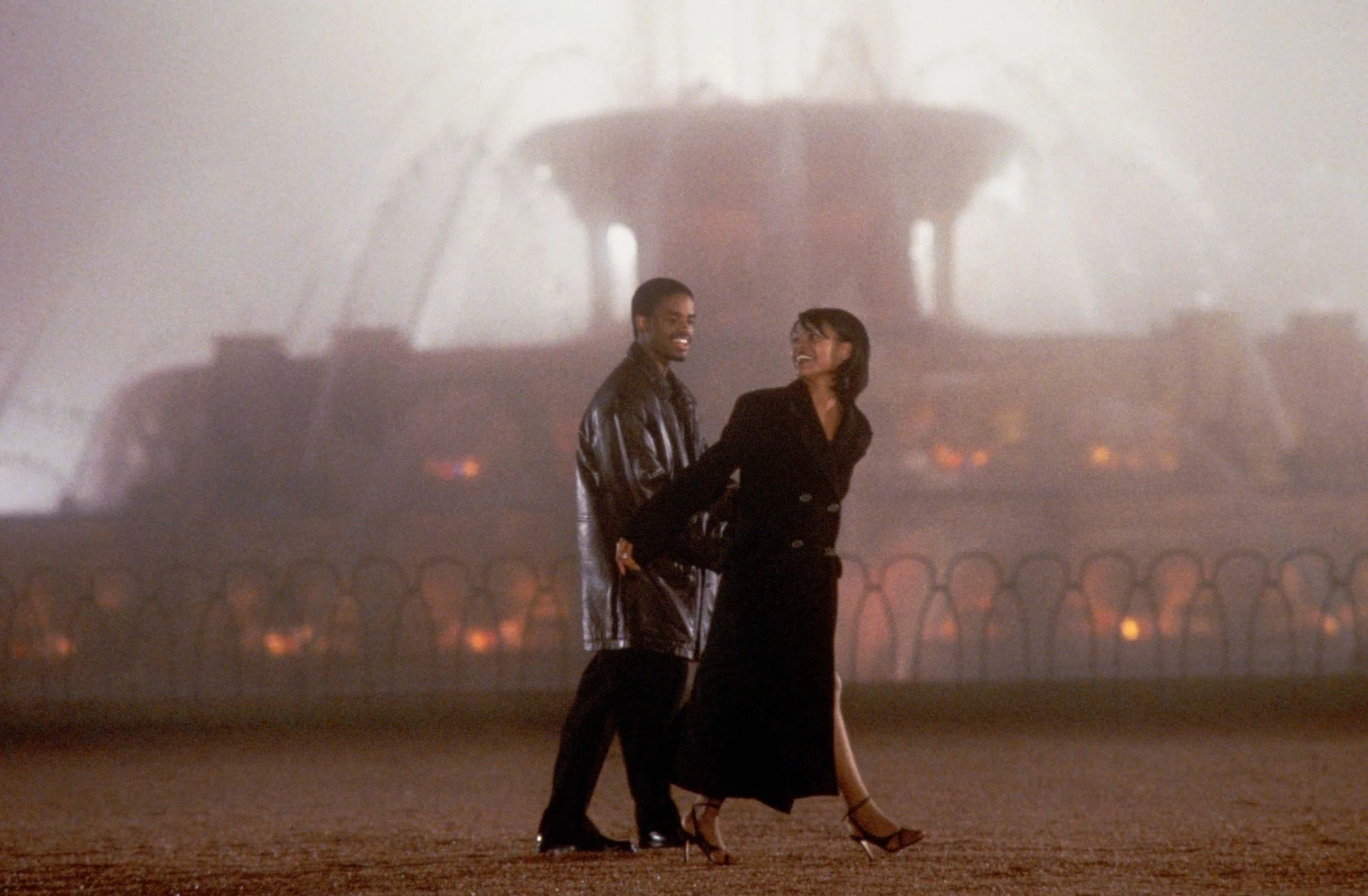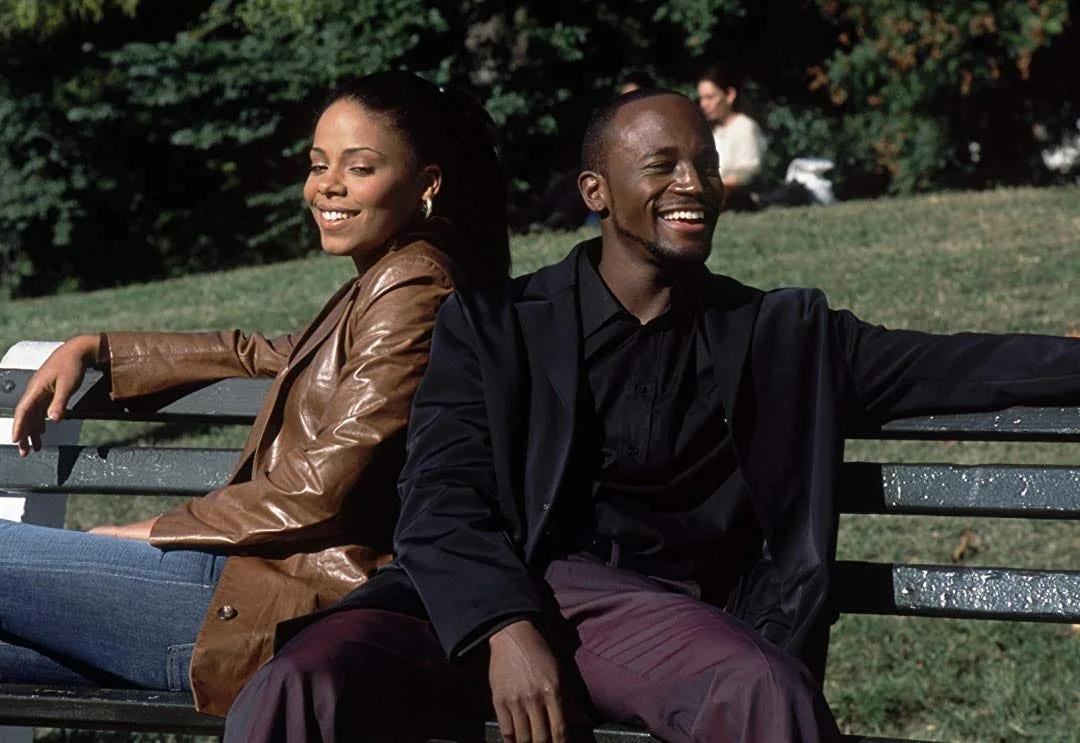We Don't Talk About Black Rom-Coms Enough
Revisiting the love-soaked era of the late 1990s and Y2K Black romantic-comedy flicks.
It's hard to say exactly when I fell for African-American romantic comedies, those gems mostly born of the pre-9/11 world: warm, stylish and full of soul. The kind of movies that would take the shape of worn and loved DVDs and tapes in the living rooms of old. Granted, I wasn't born when most of these movies first hit the screen, yet they still hold a deep historical nostalgia for me and a longing for a time that I never lived through but still feels deeply familiar.
Maybe it was the first time I heard Sidney ask, "When did you fall in love with hip-hop?" in Brown Sugar or Darius leaning into the mic to read "A Blues for Nina" in Love Jones. Whatever the exact moment was, the feeling has never left.
As a lover of all things romance, I've watched and rewatched almost every classic romance film you could name. And let's be clear: not all romance movies are perfect—often they create unrealistic and frankly unattainable expectations for love and relationships. But even so, something about this era of Black cinema just felt real.
In the '90s and 2000s, Black culture experienced a vibrant renaissance that reshaped American film and television. Fuelled by the political revolutions of the '60s and '70s, the cultural grit of Blaxploitation films and the explosive rise of hip-hop, Black creatives began to carve out a new space in Hollywood. What emerged was a genre of its own: the Black romantic comedy.
This period saw an explosion of iconic rom-coms and dramas that resonated deeply with audiences, showcasing love, friendship, ambition and the essence of Black identity. It was a pivotal moment where Black romance on screen started to feel like it was finally being taken seriously by Black audiences and the industry itself.
This was a stretch of time where we were spoiled for choice with stories that framed Black love through real connection, growth and tenderness. Movies like Love Jones (1997), The Best Man (1999) and Brown Sugar (2002) became cultural touchstones and their influence still runs deep.
“What made these films special wasn’t just their plots or box office numbers; it was the way they reframed Blackness. Black characters were no longer just sidekicks or stereotypes—they were people with full lives, careers and desires. The writing and acting were stellar, but beyond craft, these films felt authentic.”
LOVE JONES (1997)
Love Jones, directed by Theodore Witcher, told the story of Nina (Nia Long) and Darius (Larenz Tate), a photographer and a poet caught in the delicate chaos of what we now call a "situationship" long before the word existed. This movie has since become a cult classic, especially among millennials and Gen X-ers who saw in it a version of love that felt aspirational and grounded.
Love Jones was one of the first films to show Black love in a soft, sensual, and intellectual light. Darius and Nina dated, talked, shared poetry, danced, argued, broke up and came back together in a way that felt painfully real. All was set against the backdrop of Chicago to the blend of Lauryn Hill and Duke Ellington which made everything feel even more cinematic.
BROWN SUGAR (2002)
Brown Sugar is a movie that feels like a classic before the credits even roll. Directed by Rick Famuyiwa, it's part love story, part love letter to hip-hop. Sidney (Sanaa Lathan) and Dre (Taye Diggs) are childhood best friends who've spent their whole lives orbiting each other, bonded by music. Their slow burn is mirrored by the evolution of the culture and music, a classic will-they-won't-they with real stakes.
This film is as much about romantic love as it is about creative passion, community, and cultural identity. A true ode to hip-hop and its deep ties to Black identity, the film remains a staple in the Black rom-com canon. It celebrates hip-hop's roots, critiques its commercialisation, and reflects on what we lose when we forget where we come from. And the soundtrack? With Common, Mos Def, India Arie, it's iconic.
THE BEST MAN (1999)
Written and directed by Malcolm D. Lee, The Best Man is a beloved dramedy about love, friendship and loyalty within a tight-knit group of Black college friends reuniting for a wedding. At the centre is Harper (Taye Diggs), whose debut novel reveals secrets from the past, including a history with the bride-to-be, threatening the wedding and straining bonds within the group. The film delves into vulnerability, forgiveness and growth as tensions rise.
Its authentic portrayal of Black friendship, male emotional depth, and the complexity of its female characters make it unforgettable. Add in a soundtrack featuring Maxwell, The Roots and early Beyoncé: and it becomes more than just a film; it's a moment.
This movie resonated deeply with audiences and left a lasting legacy, solidified further by its sequel, The Best Man Holiday, and the follow-up mini-series, The Final Chapters.
While deeply rooted in the Black experience, the themes of these films are universal: finding love, chasing dreams, and building futures. As Malcolm D. Lee said, these films are for everyone. However, despite the success of this golden era, the genre saw a sharp decline after the mid-2000s. A combination of Hollywood disinterest, changing media consumption habits and industry gatekeeping pushed these films out of the spotlight. But that absence only deepened the nostalgia.
In a media landscape that profits off endlessly circulated Black pain, Black romance remains radical. These films wove love into the broader fabric of Black culture and life. Today, as conversations about love, gender dynamics, and wellness continue in the Black community, these films serve as both comfort and a blueprint. They captured something timeless: Black love as beautiful, complicated, joyful and worth celebrating.
film posters for Love Jones (1997), The Best Man (1999) and Brown Sugar (2002).Now, Gen-Z and Millennials are rediscovering these films, streaming them, quoting them, and remixing them into TikTok edits and playlists. In a culture craving realness and authenticity, where dating is dominated by swipe culture, apps and curated personas, these stories remind us of a different rhythm. A reminder of a slower love, rooted in intentionality, long glances and late-night conversations with records playing in the background. These movies gave us a cinematic language for love that continues to influence how we write, imagine and want to be loved.
Their legacy lives on, evolving through modern films and series that include representations of queer love and fresh narratives. These movies remain an invaluable part of the Black cinematic canon, inspiring a new wave of storytellers while honouring the ones who came before, making space for the future of Black romance on our screens.
For me, this golden era will always be part of the reason I fell in love with Black cinema. The '90s and 2000s weren't just about love stories but about seeing ourselves. And if we're lucky, the next chapter of Black romance in film is already being written.
The Culture Crypt Recommends:
Love & Basketball (2000)
Poetic Justice (1993)
Waiting To Exhale (1995)
How Stella Got Her Groove Back (1998)
Two Can Play That Game (2001)
Deliver Us From Eva (2003)
Last Holiday (2006)







